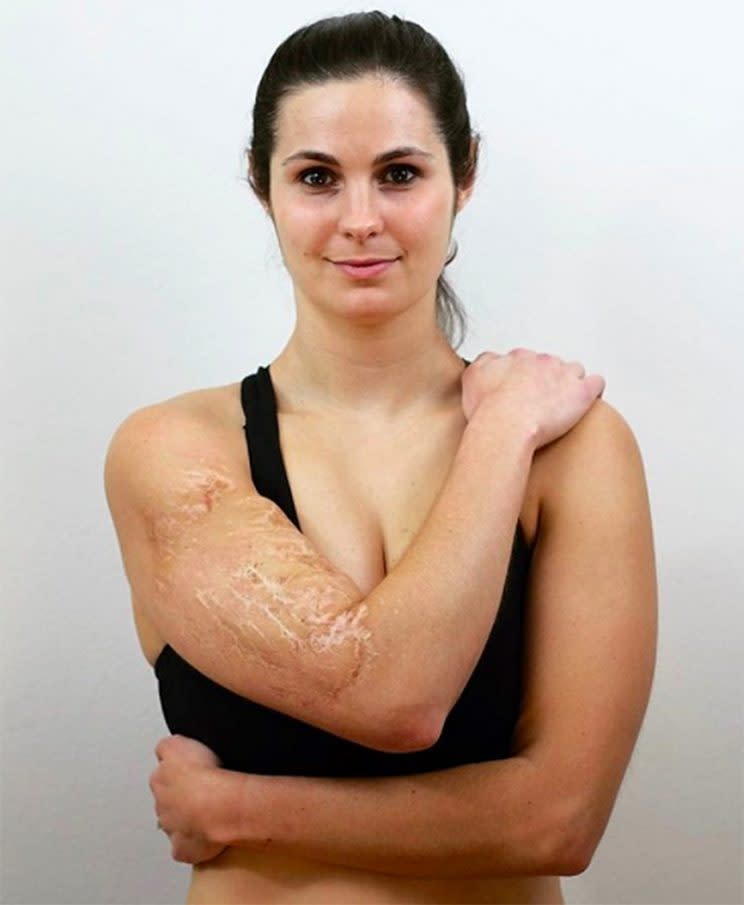One Woman Explains the Etiquette Behind Asking People About Their Scars

Talking about scars can make for pretty interesting and illuminating conversation, but as with anything, there’s a right way and a wrong way to do it. Molly O’Shea — a body-positive coach, health coach, and personal trainer — recently published a post on her blog addressing just this.
O’Shea has prominent scarring on her right arm as a result of a horrible car accident. “I fractured my neck, along with some pretty other painful injuries, including scars on my right arm,” she explained in the About Me section of her website. “Just to put into perspective how serious it was, I fractured my neck where [actor] Christopher Reeve [who played Superman] did. He became quadriplegic due to his neck fracture. Thankfully, I survived.”
In a post titled, “How to Ask Someone About Their Scars,” O’Shea discusses the polite way to inquire so that the person with the scar isn’t offended, or made to go through recounting what may have been an extremely traumatic experience. “For me, when people are genuine when they ask, I can feel that,” she wrote. “Usually the question will start with ‘Do you mind if I asked what happened to your arm?’ Every time someone asks me, especially with that beginning, I always say, ‘No, I don’t mind at all; thank you for asking.'”
She continued: “This helps make the person feel comfortable. It’s important to note that this is an awkward situation for both people. Usually the best response here is, ‘Wow, I’m sorry to hear that happened. Are you OK now?’ I’ve found that this is when I feel the most comfortable. Or sometimes if they don’t ask if I’m OK at the end, I will just say, ‘No worries. I’m fine now!'”
O’Shea told Yahoo Beauty that she felt “compelled” to tell her story “because I have an experience with my scars on a daily basis. Scars impact a lot of people, especially a lot of people that follow me. The post was really just based on my experiences. Everyone has a different story, but I wanted to provide some content for people who have asked what’s the best way to ask about scars. I think it’s something that’s becoming more common, and it can be hard to figure out how to ask.”
O’Shea took her message to Instagram days later to discuss a recent situation related to her blog post. In the Instagram post, we see a photo of O’Shea’s scars, with a caption recounting an incident at a nail salon, where a woman approached her asking about them. The conversation started off fine, but took a turn once O’Shea mentioned that her scars were the result of a car crash. “To my surprise she responded: ‘Oh, that’s nothing.’ A little taken aback, I responded and told her I fractured my neck. Her response was: ‘Well, you’re fine now, right?’ After I responded saying yes, she replied, ‘Yeah, you’re fine.'”
She says that this interaction was painful because, although the woman O’Shea was speaking with likely didn’t mean to discount her experience, it did come across as dismissive and diminishing to say that she was “fine,” as if the traumatic ordeal didn’t have a huge impact on O’Shea’s life.
“I know that this woman did not mean it maliciously,” she wrote. “I’m sure there are underlying reasons she responded this way. … I know there are people out there who have lost limbs or even died and I’m lucky to be alive.”
O’Shea said that while her experience may not have been as devastating on her body or spirit as it is for people in other situations, it’s important to acknowledge the fact that people have different feelings about their scars, and may react differently to inquiries about them.
O’Shea knows well the delicate situations that come from talking about scars. It’s one of the reasons she wrote the post in the first place. She realizes that some people feel uncomfortable asking about them, partially because we live in a society that is so obsessed with perfection. “We don’t see many people with scars in the media; it’s all about perfection,” she tells Yahoo Beauty. “Scars are unique, and I think when people see them it can come as a surprise.”
She adds: “It’s also hard because you don’t know how they got those scars and you don’t want to bring up a traumatic event. I find that happens often and people just avoid asking altogether in fear of bringing up wounds. It can be a hard situation to navigate for both parties, but my hope is if we start talking about it more or seeing more scars, [then] maybe that will shift.”
She hopes that her stories will help others at least be more mindful about the way they approach scars. “The best time I’ve been asked about my scars was while living in Ireland,” she says. “People always asked. It was never something that was off limits for them. When they did ask, they were comfortable and confident asking. This made me comfortable when responding and telling my story.”
Read more from Yahoo Style + Beauty:
Follow us on Instagram, Facebook, and Pinterest for nonstop inspiration delivered fresh to your feed, every day. For Twitter updates, follow @YahooStyleand@YahooBeauty.
